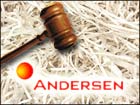
NEW YORK (CNN/Money) - Arthur Andersen LLP is trying to stop the government from interviewing witnesses before a grand jury and further building its case against Andersen, which stands accused of obstructing justice by shredding Enron Corp. documents.
Lawyers for Andersen filed a motion late Monday to prevent the Department of Justice from calling at least four Andersen partners and employees and questioning them again under oath before a grand jury. Each of the witnesses has already been extensively interviewed, the court papers said.
Andersen is asking that the DOJ not be allowed to question the witnesses before the grand jury until the trial, which is slated to start May 6, is completed, the court documents said.
"It is settled law that, once an indictment has been returned, the government may not use the grand jury to conduct discovery or otherwise prepare its case for trial," Andersen said in the motion.
The Department of Justice will file its response on Thursday, a spokesman told CNN/Money.
On March 14, the Department of Justice indicted Andersen for allegedly obstructing justice when it shredded Enron Corp. documents. The agency alleged that the accounting firm engaged in the wholesale destruction of documents, shredding literally "tons" of Enron papers and purging volumes of information.
The DOJ did interview witnesses before the indictment of Andersen but put no Andersen personnel before the grand jury. In fact, the DOJ refused to let an Andersen representative appear before the jurors and only one or more Federal Bureau of Investigation agents were allowed to testify, Andersen said.
On March 15, Andersen said it would vehemently fight the criminal charge against it. That same day, the government asked three Andersen partners and one employee -- including Roger Willard, Shane Philpot and Timothy McCann -- to appear before the grand jury, the court papers said.
The government can use the grand jury to receive evidence after an indictment if it is investigating the possibility of bringing additional charges or charging more defendants, Andersen said.
But the DOJ cannot use the grand jury to obtain direct testimony and evidence that it will use to build the trial case against it, Andersen said. There is no compelling need to place witnesses before the grand jury now to broaden the scope of the DOJ's investigation and the case will likely not grow stale in the two months until the trial starts, Andersen said.
"And it is, after all, the government that made this bed: having rushed to indict on an extraordinary expedited schedule, the Justice Department is in no position to complain if temporary restrictions on the grand jury are necessary to prevent the government from obtaining an unfair and improper advantage trial," Andersen said.

|

